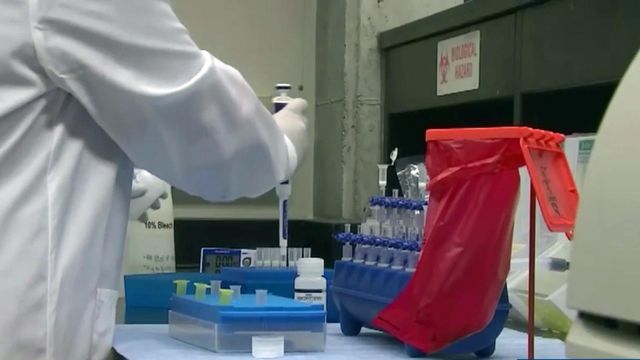Duke researchers studying infected people to find treatment for coronavirus
A Duke University research team is studying people who have been infected with the new coronavirus to find a treatment for COVID-19.
Posted — UpdatedThe team, led by Chris Woods, a professor of infectious diseases at Duke and the chief of infectious diseases at the Durham VA Health System, is trying to determine if the immunity their bodies have built up against the virus could be transferred to the most ill patients.
"We don’t know much about this particular infection, so it’s imperative that our clinical research personnel are similarly working around the clock to get to these answers as quickly as possible," Woods said Friday.
About 40 people have enrolled in the study so far, and Woods said the team is looking for people who have had an "ideal response," or relatively mild symptoms, to learn as much as possible about the virus and about how people are fighting off the infection.
"We are learning a lot, I will say, about the varied presentations of illness, particularly in these milder cases," he said. "I say, if you’ve seen one case of COVID-19, you’ve seen one case of COVID-19. They’re quite variable at this early stage."
The "ideal response" patients may ultimately give plasma to others to treat them, he said, noting that his team had "some encouraging results" in similar studies with Ebola.
"I’ve really been lucky in that I’ve had very, very little symptoms," Cooke said. "I maybe kind of felt like a flu for one or two days, but other than that, I’ve been completely fine and healthy – just quarantining and staying away from the rest of the world."
She called the Duke study "a great opportunity."
"I’ve been lucky enough to feel pretty good with corona, but I know a lot of people aren’t, so I was figuring, if there was anything I could do and be a guinea pig right now, it’s probably worth it if it helps in any way possible," she said.
The researchers have taken several blood samples and nasal and oral swabs – Cooke compared the nasal swab to "basically scrubbing your brain" – from participants to see any changes in the virus and the body's reaction to it over time.
"The purpose of our study is to learn as much as we can about the infection from those individuals who have recently been infected, and that helps us both to develop diagnostics, therapeutics, as well as a vaccine," Woods said.
The Department of Defense has funded similar studies by Woods on other diseases for more than a decade to help detect infections before the onset of symptoms, he said.
All 40 participants so far are from central North Carolina, and Woods said he is looking for more people.
"The more individuals we have participating, the greater the opportunity to continue to learn and to be able to perform assessments across a range of disease severity," he said. "So, we are enrolling in the hospitals, in the community, in the emergency departments."
Related Topics
• Credits
Copyright 2024 by Capitol Broadcasting Company. All rights reserved. This material may not be published, broadcast, rewritten or redistributed.






